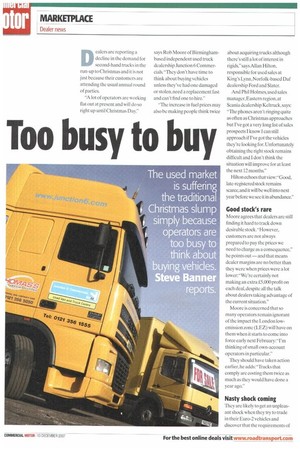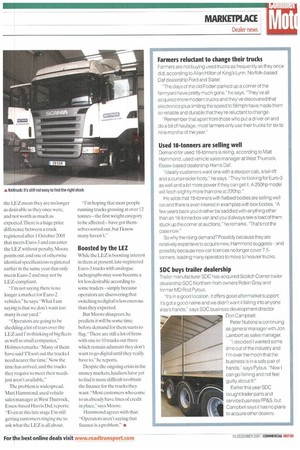Too busy to buy
Page 72

Page 73

If you've noticed an error in this article please click here to report it so we can fix it.
Dealers are reporting a decline in the demand for second-hand trucks in the run-up to Christmas and it is not just because their customers are attending the usual annual round of parties.
"A lot of operators are working flat out at present and will do so right up until Christmas Day," says Rob Moore of Birminghambased independent used truck dealership Junction 6 Commercials."They don't have time to think about buying vehicles unless they've had one damaged or stolen, need a replacement fast and can't find one to hire."
"The increase in fuel prices may also be making people think twice about acquiring trucks although there's still a lot of interest in rigids," says Allan Hilton, responsible for used sales at King's Lynn,Norfolk-based Daf dealership Ford and Slater.
And Phil Holmes, used sales manager. Eastern region, at Scania dealership Keltruck,says: "The phones aren't ringing quite as often as Christmas approaches but I've got a very long list of sales prospects I know I can still approach if I've got the vehicles they're looking for. Unfortunately obtaining the right stock remains difficult and I don't think the situation will improve for at least the next 12 months."
Hilton echoes that view:"Good, late-registered stock remains scarce, and it will be well into next year before we see it in abundance."
Good stock's rare Moore agrees that dealers are still finding it hard to track down desirable stock. 'However, customers are not always prepared to pay the prices we need to charge as a consequence," he points out — and that means dealer margins are no better than they were when prices were a lot lower: "We're certainly not making an extra £5,000 profit on each deal, despite all the talk about dealers taking advantage of the current situation."
Moore is concerned that so many operators remain ignorant of the impact the London lowemission zone (LEZ) will have on them when it starts to come into force early next February:"I'm thinking of small own-account operators in particular."
They should have taken action earlier, he adds: "Trucks that comply are costing them twice as much as they would have done a year ago."
Nasty shock coming They are likely to get an unpleasant shock when they try to trade in their Euro-2 vehicles and discover that the requirements of the LEZ mean they are no longer as desirable as they once were. and not worth as much as expeeted:There is a huge price difference between a truck registered after 1 October 2001 that meets Euro-3 and can enter the LEZ without penalty. Moore points out, and one of otherwise identical specifications registered earlicr in the same year that only meets Euro-2 and may not be LEZ-compliant.
"I'm not saying there is no longer a market for Euro-2 vehicles," he says."What I am saying is that we don't want too man in our yard, ' perators are going to be shedding a lot of tears over the LEZ and I'm thinking of big fleets as well as small companies," Holmes remarks."Many of them have said `I'll sort out the trucks I need nearer the time.' Now the time has arrived, and the trucks they require to meet their needs just aren't available."
The problem is widespread. Mall Hammond, used vehicle sales manager at West Thurrock, Essex-based Harris Daf, reports: "Even at this late stage I'm still getting customers ringing me to ask what the LEZ is all about. "I'm hoping that most people running trucks grossing at over 12 tonnesthe first weight category to be affectedhave got themselves sorted out, but I know many haven't."
Boosted by the LEZ
While the LEZ is boosting interest in them at present, late-registered Euro-3 trucks with analogue tachographs may soon become a lot less desirable according to some traders-simply because operators are discovering that switching to digital is less onerous than they expected.
But Moore disagrees he predicts it will be some time before demand for them starts to flag."There are still a lot of firms with one to 10 trucks out there which remain adamant they don't want to go digital until they really have to," he reports.
Despite the ongoing crisis in the money markets, hauliers have yet to find it more difficult to obtain the finance for the trucks they want. "Most customers who come to us already have lines of credit in place,says Moore.
Hammond agrees with that: "Operators aren't saying that finance is a problem." •






















































































































































































